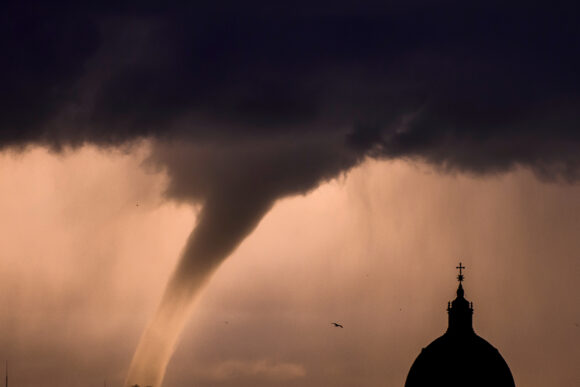The type of weather phenomenon that may have led billionaire Mike Lynch’s yacht to sink in the Mediterranean this week is now more likely to happen as global warming has raised sea temperatures, according to climate experts.
The tech tycoon’s luxury sailboat, the Bayesian, was anchored off the Sicilian coast early on Monday when a swirling mass of wind and water — known as a waterspout — rocked the vessel amid stormy conditions. It is still being investigated why the 56 meter (184 feet) long ship, worth an estimated £30 million ($39 million), quickly submerged despite being built to withstand hurricanes.
Of the 22 passengers in the boat, 15 were rescued on Monday. Lynch and Morgan Stanley International chair Jonathan Bloomer were among the victims found dead.
Tornado-like events are not uncommon in Italian waters during the late summer, as sea temperatures are at their warmest levels, but this year has been exceptionally hot. The Mediterranean broke the record for its highest ever daily mean sea surface temperature with 28.47C (83.2 F) on Aug. 15.
Peter Inness, a meteorologist at the University of Reading, said warming waters are feeding heat and humidity in the lower atmosphere — the two main ingredients needed for forming waterspouts — meaning such events are now more likely. “We can’t point to climate change as the culprit for the storm that sunk the superyacht in Sicily, but it’s clear that warmer seas are creating a more hospitable environment for waterspouts,” he said.
A University of Barcelona study of areas around the Balearic Islands found waterspouts are more likely in warmer waters. The sea surface in the region of Sicily is now as much as 3C (5.4F) above the 1990-2020 average, according to Inness.
Italy experiences more than 100 “tornadic events” a year, said Andrew Pedrini, a meteorologist at forecaster Atmospheric G2, but offshore marine spouts often go unreported.
Commenting on whether the tragedy with the Bayesian could have been foreseen and prevented, Salvo Cocina, head of Sicily’s Civil Protection Agency, said: “Predicted, perhaps, only at the level of probability — but it is impossible to calculate the position and time of the absolutely localized phenomenon.”
“The sea is much warmer than past years and has a very strong potential and this increases the severity of weather events,” he said.
The Mediterranean has long been the favored summer yachting scene for the world’s rich and famous — not only because of its glamourous landscapes but also its less dramatic weather risks compared with the hurricane-prone Caribbean at this time of year. Yet extreme weather events are becoming more frequent and intense across the region as global temperatures continue to increase.
Last year the Mediterranean experienced a rare hurricane-like storm that ripped through Libya, killing thousands of people in floods. So-called medicanes — like hurricanes, typhoons and cyclones — can develop an eye or clear patch at their core, and whip up strong fields of winds and thunderstorms, along with bringing torrential rain.
Meanwhile, abnormally hot oceans worldwide are fueling forceful storms this year. Hurricane Beryl, which formed in June, was the earliest Atlantic hurricane on record to be classified as Category 5, the most powerful on the five-step Saffir-Simpson scale.
Photograph: Italy is struck by about 100 tornadoes a year, according to AtmosphericG2. Photo credit: Antonio Masiello/Getty Images
Related:
- Hiscox Confirms Chairman Bloomer Died During Yacht Accident Off Coast of Sicily
- Yacht Insurer OMAC Is Hull Carrier for Yacht Sunk Off Sicily, Sources Say
- Update: Divers Retrieve 5th Body From Mike Lynch Yacht Sunk Off Sicily
- People Moves: Hiscox Appoints Bloomer as Chair, Succeeding Childs; SCOR Names de Varenne as Group CFO and Deputy CEO
Was this article valuable?
Here are more articles you may enjoy.



 One of Highest Property Claims Severity Recorded in Q3 on Low Volume, Says Verisk
One of Highest Property Claims Severity Recorded in Q3 on Low Volume, Says Verisk  State Insurance Legislators ‘Greatly Disturbed’ by Trump AI Regulation Order
State Insurance Legislators ‘Greatly Disturbed’ by Trump AI Regulation Order  US House Bill Aims to End Private Flood Insurance Coverage Penalty
US House Bill Aims to End Private Flood Insurance Coverage Penalty  Hacking Group ‘ShinyHunters’ Claims Theft of Data From Users of Pornhub
Hacking Group ‘ShinyHunters’ Claims Theft of Data From Users of Pornhub 

